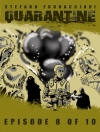Monika Maron, the great German writer still today at the forefront of her creative generation, saw her country East Germany disappear in civil unrest, departures and finally the fall of the Berlin Wall.
Spis treści
Acclaim for The Defector
The Defector 1
First Interlude 25
Second Interlude 81
Third Interlude 117
Fourth Interlude 165
About Monika Maron 217
About the Translator 221
About Readers International 223
O autorze
MONIKA MARON was born in wartime Berlin in 1941 to an anti-fascist mother of Polish Jewish ancestry and a German father. She moved in 1951 from West to East Berlin with her mother and stepfather, Karl Maron, who rose to become a GDR Minister of the Interior. She grew up as a member of the communist élite of East Germany, rebelling as a teen against her stepfather but joining the Party in 1965, thinking as she said to oppose its 'anti-democratic’ tendencies from within. She quickly understood, she said, that 'you cannot close up a people in a wall.’ She left the Party, studied drama at the East Berlin Theater School, and then worked as a journalist for Für Dich (For You), a women’s magazine, then for six years at the weekly Wochenpost, and later as a freelance.Between 1976 and 1978 while working on Flight of Ashes, her first novel drawing on her experience as a journalist on an official weekly, she co-operated with the HVA, the foreign intelligence service of the STASI, East Germany’s infamous secret police, according to an exposé of her STASI file in 1995. According to the notes on her file published by Der Spiegel, she agreed to report on West Germans whom she met, but refused to compromise East German friends, in return for the ability to travel to West Berlin to research the autobiographical background to her novel. She did not get the travel pass, despite showing chapters of the manuscript of Flight of Ashes to her spy handler. The book was banned and later published in West Germany in 1981 to acclaim and controversy for exposing the environmental degradation – extreme even by East German standards – of the industrial/chemical factory town Bitterfeld, now called Bitterfeld-Wolfen in Saxony-Anhalt in the former GDR. In 1988, ten years after the STASI judged her an unreliable contact, Monika Maron managed to leave the GDR on a three-year visa. Thus she was able to publish her second novel The Defector in West Germany. A year later in 1989 the Berlin Wall fell, and shortly thereafter East Germany disappeared. After living in Hamburg, until 1992, she returned to a reunited Berlin, where she still lives and writes.












